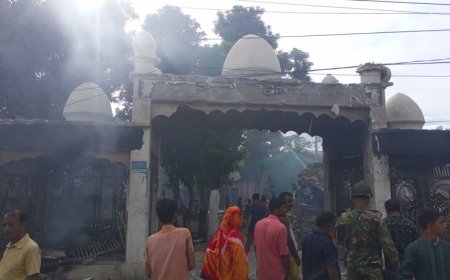Absence of Pakistan, absence of problems
India has delivered a strong message by suspending the Indus Waters Treaty with Pakistan, signaling that Pakistan — seen as a hub for terrorism — must face economic consequences to curb its support for extremist activities. Alongside this move, India has also decided to reduce the staff at the Pakistani embassy, expel all Pakistani nationals from its territory, and shut down the Wagah-Attari border crossing.

The patriotic people of occupied Balochistan, like the rest of the civilized world, stand firmly with India against Pakistan’s relentless campaign of terrorism. For over seven decades, the Baloch nation has endured the same brand of terror that India is now confronting. Pakistan’s existence has become akin to a cancerous presence in South Asia—its policies of violence, extremism, and oppression poisoning the region. This reality has been laid bare once again by Pakistan’s continued support for terrorist activities, culminating recently in the brutal Pahalgam attack, where innocent Indian tourists were targeted, resulting in the death of 27 and injuries to 17 others. This heinous act is not merely terrorism; it must be treated and prosecuted as a war crime.
The grief and anger felt by India are shared deeply by the Baloch people. Seventy million patriotic Baloch stand in complete solidarity with India during this difficult time. Balochistan itself has suffered under Pakistan’s occupation since 1948. During these long decades of brutal suppression, approximately 100,000 unarmed Baloch civilians have been martyred, while around 40,000 others have been forcibly abducted by Pakistani forces, languishing under torture in secret prisons. Pakistan has systematically looted Balochistan’s vast natural resources, fueling its military ambitions and terrorist networks with the wealth stolen from the oppressed Baloch people.
The pain is personal and heartbreaking. Among the many tragic images emerging from the Pahalgam attack was that of a young woman whose husband, married to her just weeks earlier, was brutally murdered by Pakistan-trained terrorists on April 22. This harrowing scene mirrors a similar tragedy in Balochistan, where a young graduate—full of hope for the future—was executed with eight bullets to the head by Pakistan’s terrorist army in front of his grieving parents. His only "crime" was his identity as a proud Baloch. Just as the innocent Hindu brothers and sisters who were brutally killed in Pahalgam had committed no offense but choosing to holiday peacefully in Kashmir, these systematic acts of brutality reveal Pakistan’s deep intolerance for peace, freedom, and humanity.
In response to the growing terrorist threat, India has taken strong and necessary steps. By suspending the Indus Waters Treaty with Pakistan, India has signaled to the world that Pakistan must be economically crippled in order to halt its sponsorship of terror. Complementing this move, India has also decided to reduce the number of Pakistani diplomatic staff, expel all Pakistani nationals from its territory, and close the Wagah-Attari border. These actions are not merely diplomatic; they are moral and humanitarian imperatives, setting an example for the global community that relations with a terrorist state like Pakistan are a crime against humanity.
Voices from around the region have echoed this sentiment. The people of Afghanistan, through social media, have sent strong messages of solidarity with India, condemning the Pahalgam attack. From Balochistan too, powerful suggestions and proposals have surfaced. Pro-independence Baloch activists have called for India to not only sever ties with Pakistan but also to recognize the Baloch struggle against occupation. They propose that India facilitate the creation of a Free Balochistan government-in-exile, similar to Qatar’s earlier hosting of a political office for the Taliban, which eventually led to broader international recognition. The Baloch leadership, particularly the honorable Hyrbyair Marri, could be instrumental in representing Balochistan’s legitimate aspirations for freedom. Such a move would not only discredit Pakistan on the world stage but also enable India to enter into political, diplomatic, defense, and economic agreements with Free Balochistan.
Meanwhile, Pakistan’s announcement of the closure of its airspace to Indian flights has sparked sharp reactions within Balochistan. The Baloch people rightly question Pakistan’s authority to control their skies. As an occupying force, Pakistan has no legal or moral right to dictate terms over Balochistan’s territory without the consent of its people. India should actively support Balochistan’s legal battle for independence and challenge Pakistan’s occupation in international courts, applying maximum diplomatic and legal pressure for Pakistan’s withdrawal.
Similarly, the Taliban authorities in Afghanistan must reconsider their stance regarding the closure of borders by Pakistan. Historically, Balochistan and Sindh have never been legitimate parts of Pakistan. The Durand Line remains a disputed boundary. By recognizing an independent Balochistan, Afghanistan could gain vital access to Gwadar port, thereby solving its trade and economic challenges. Furthermore, Afghanistan holds strategic significance for India; the reopening of Bagram Airbase and other facilities could allow Indian forces to help train Afghan troops, jointly eliminating Pakistan-backed terrorist bases, and reinforcing regional security.
Encouragingly, resistance against Pakistan’s oppressive Punjabi army is gaining momentum across Balochistan, Sindh, and Pashtunistan. If Sindh were to block water supplies, if Balochistan were to halt the flow of minerals, if Pashtunistan were to cut electricity, and if Afghanistan were to stop fruit exports to Pakistan, Pakistan’s economy would collapse within six months. Such collective action would push Pakistan back to the Stone Age, ending its decades-long cycle of using looted resources to train, fund, and arm terrorists across South Asia — terrorists responsible for atrocities from Mumbai to Uri, Pulwama, and now Pahalgam.
Pakistan has transformed into a malignancy that must be decisively confronted. Delaying its containment will only increase the suffering of millions across the region. Therefore, India must work with its allies to support the complete freedom of Pakistan-occupied Kashmir (PoK), Balochistan, Sindh, and Pashtunistan. Only by dismantling Pakistan’s terror apparatus and liberating its captive nations can lasting peace and security be established in South Asia. The time for action is now.
What's Your Reaction?




















































































